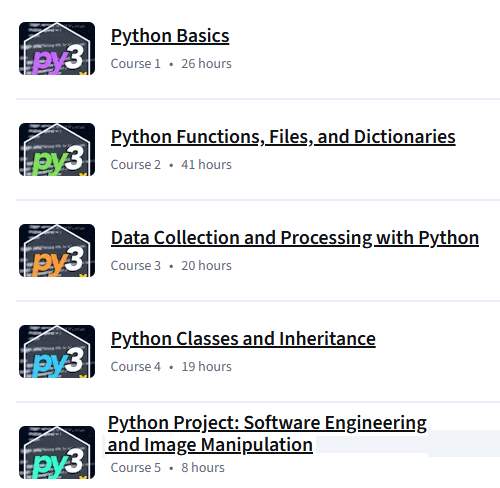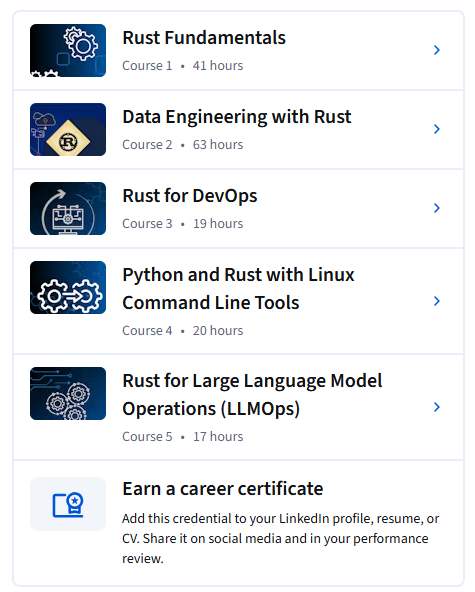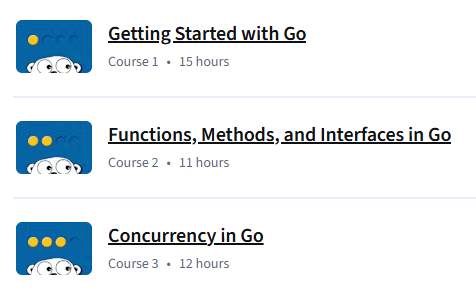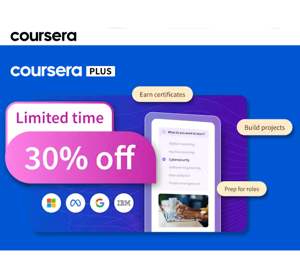| Learn A New Language With Coursera Plus |
| Written by Sue Gee | |||
| Wednesday, 27 August 2025 | |||
|
Expand your portfolio of skills with a new programming language. Coursera currently has an offer - 30% off an annual subscription to Coursera Plus. This runs until September 22, 2025 and is available to new Coursera Plus subscribers. We know from surveys of how developers like to learn that they like online courses and that Coursera is the most popular platform. Coursera Plus, which gets you unlimited access to 10,000+ courses from world-class universities and from companies Google and Microsoft, normally costs $59 for a monthly subscription or $399 for an annual one but currently, in one of its seasonal offers, new subscribers can save 30% on the price of an annual subscription. Coursera's gamble is that if you are a person who loves learning - and research has shown that on the whole programmers are - you'll be hooked and will stay with the platform over many years. While Coursersa has courses on all the hot topics of AI, Cybersec, Data Science, today's focus is on learning a new languages. Python is of course the most popular language to learn and Coursera offers lots of possibilities both for beginners and for seasoned developers, many of which we have already covered on I Programmer. The most popular starting point for complete newbies is Programming for Everybody (Getting Started with Python) is aimed at a wide audience and has no pre-requisites. It has clocked up 3,394,533 enrollments with 98% of learners liking the course, giving it a star rating of 4.8 out of 5. From the University of Michigan and taught by Charles (Chuck) Severance it is designed as a first programming course using Python with simple data analysis programming exercises which can be done in the browser. When we first reported on this course at its launch in April 2014, it was a 10-week course requiring 2-4 hours per week. Now it is billed as a 2-week course requiring 10 hours per week, but of course with Coursera Plus you have full access to the course and you can go at your preferred pace. This course of also the starting point for the Python for Everybody Specialization, again aimed at beginners to programming which adds another three courses, Python Data Structures (19 hrs); Using Python to Access Web Data (18 hrs) and Using Databases with Python (13 hrs) plus a project that pulls it all together: Capstone: Retrieving, Processing, and Visualizing Data with Python(9 hrs). Not only has Python become the most popular language for teaching programming to beginners a survey showed that between a third and a half or developers with another primary language wanted to learn it and one recommendation for this audience, the Python 3 Programming Specialization, also comes from the University of Michigan. This comprises five courses: While it starts at the beginning, with variables, conditionals, and loops, it quickly reaches some intermediate material like keyword parameters, list comprehensions, lambda expressions, and class inheritance. By the end of the second course, you will create a simple sentiment analyzer that counts the number of positive and negative words in tweets. In the third course, you will mash up two APIs to create a movie recommender. The final course, has an extended project, Python Project: pillow, tesseract, and opencv in which learners perform optical character recognition (OCR) and object detection in images. Also highly rated is Google's Crash Course on Python. Comprising five modules, the final one of which is a project, it is expected to require 15 hours. It is the first course in the Google IT Automation with Python Professional Certificate, a 7-course series designed for those already in the industry. See Coursera Offers Google IT Automation With Python Professional Certificate for details. In successive Stack Overflow survey Rust emerges as the most sought after language - the one that people who haven't used it are most interested in. The problem is that it has a steep learning curve. Help is at hand from Rice University which offers the Rust Specialization. While this is billed as Beginner level you are expected to have some programming experience in another language and even from the course titles you can see that it requires a major investment of time and covers a great deal: However, earning a certificate to show you have successfully completed this specialization will make the time and effort well spent. Go developers are among the highest paid in the industry, and it is a language with a very high developer satisfaction rate which are two good reasons for learning about it. Programming with Google Go Specialization comprises three courses which go from beginner to advanced. By completing the three-course sequence, learners will have gained the knowledge and skills needed to create concise, efficient, and clean applications using Go and again will be awarded a shareable certificate. For more details see Go Specialization On Coursera. The Coursera Outcomes Survey found that 95% of learners report personal benefits from learning on Coursera - 62% increased their confidence and nearly half felt they have more opportunities for career growth. It also revealed a feedback effect that benefits the company: As learners gain confidence, they want to continue to grow. Nearly all (98%) learners intend to continue learning, with 75% intending to enroll in another course or program on Coursera. From Coursera's point of view, giving a big discount to attract new learners is perfectly sound. But from the learner's point of view Coursera Plus is ideal - with 100,000 offering to choose from you can hone your skills and gain certificates to prove it whenever you have time to do so making this offer which is available by following this link, Coursera Plus Offer, one that is well worth snapping up. More InformationPython for Everybody Specialization Related ArticlesCoursera Plus For A Year's Worth Of Study A Crash Course on Python By Google Coursera Offers Google IT Automation With Python Professional Certificate To be informed about new articles on I Programmer, sign up for our weekly newsletter, subscribe to the RSS feed and follow us on Twitter, Facebook or Linkedin.
Comments
or email your comment to: comments@i-programmer.info |
|||
| Last Updated ( Wednesday, 27 August 2025 ) |





